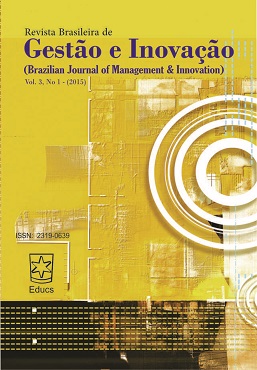O AGRONEGÓCIO DO TRIGO E SEUS DERIVADOS: O EFEITO DA DESREGULAMENTAÇÃO E REDUÇÃO DOS SUBSÍDIOS NO BRASIL
Palavras-chave:
Agronegócios. Subsídios. Desregulamentação. Mercado alimentar. Derivados de trigo.Resumo
Impostos e subsídios podem influenciar o mercado alimentar, alterando o preço e o consumo de alimentos. O presente estudo analisou o efeito da redução dos subsídios e da abertura econômica nos preços do trigo pago ao produtor, da farinha e das massas alimentícias no Brasil. Foram comparados os preços em dois períodos: de 1980 a 1990 caracterizado por expressivos subsídios; e de 1991 a 2010 com redução nos subsídios e abertura econômica. Regressões lineares múltiplas foram utilizadas para testar a dependência do preço das massas em relação ao preço do trigo e da farinha. Adicionalmente, a elasticidade preço da demanda foi calculada para analisar a sensibilidade do consumo da farinha e massas em relação às alterações de preço. Os resultados indicam que os subsídios à produção do trigo e ao consumo de farinha podem ter beneficiado os preços para os produtores nacionais de trigo e consumidores de farinha durante o período de regulamentação, mas implicavam no aumento do preço das massas. As alterações no preço da farinha e das massas influenciaram seu consumo. O consumo da farinha de trigo reduziu em maior proporção do que o acréscimo de preço. O consumo de massas aumentou o que pode estar associado a uma redução de preço e melhoria nas condições de renda. Subsídios e impostos geram efeitos diretos e indiretos, portanto qualquer intervenção deve ser analisada, buscando promover benefícios a produtores e consumidores, porém garantindo custos sociais mínimos.
DOI: 10.18226/23190639.v3n1.06
Downloads
Publicado
Como Citar
Edição
Seção
Licença
Declaro que o presente artigo é original, não tendo sido submetido à publicação em qualquer outro periódico nacional ou internacional, quer seja em parte ou em sua totalidade. Declaro, ainda, que uma vez publicado na Revista Brasileira de Gestão e Inovação (Brazilian Journal of Management & Innovation), o mesmo jamais será submetido por mim ou por qualquer um dos demais co-autores a qualquer outro periódico. Através deste instrumento, em meu nome e em nome dos demais co-autores, porventura existentes, cedo os direitos autorais do referido artigo Revista Brasileira de Gestão e Inovação (Brazilian Journal of Management & Innovation), que está autorizada a publicá-lo em meio impresso, digital, ou outro existente, sem retribuição financeira para os autores. Em virtude de aparecerem nesta revista de acesso público, os artigos são de uso gratuito, com atribuições próprias, em aplicações educacionais e não-comerciais.








